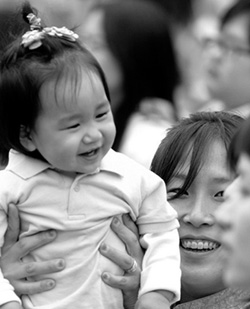
"I came here in search of my mother with hopes of tracing back my true bloodline and birth," says Henrick Andersen, originally Korean, but who was adopted by his Swedish parents twenty four years ago. "I am going back home now without finding much of what I was looking for. There is just that bit of hollowness and bitterness that lingers in my heart from not being able to see my biological mother and not knowing whether I will ever be able to hold her hands," comments Henrick with the shade of tears in his eyes. Andersen is just one of the numbers of adopted children who visit South Korea to seek their mothers and family backgrounds.
Statistics from Holt Children's Services show that approximately 3,000 to 5,000 adopted children visit South Korea each year to find their biological mothers. The increasing number of cyber cafes and links to programs specifically targeted to help the adopted children find their mothers in South Korea shows the large percentage of children who were adopted by foreign parents in the past. From the 1970s to the 1990s, the number of children who were adopted by mostly American, Canadian, and European parents increased by six times from approximately 200 to 1,200. Despite South Korea? enhanced status from the war-torn nation of rubbles to a proud member of the OECD, not much has changed regarding the high percentage of children who are adopted abroad.
According to Jang Young-mee, the sponsorship section representative of the Social Welfare Society, enlivening the culture of domestic adoption is vital. "Youth Koreans generally consider adoption as an insult to one's family traditions and dignity. However, this belief must be altered," says Kim.
The Social Welfare Society highlights people's stereotypes as the utmost barrier to activating domestic adoption. Usually, parents think that adopted children will feel abandoned and start to misbehave after finding out about their birth. Also, people believe finding out the genetic background and detecting the child's hereditary diseases will be difficult. In addition, the question of whether a parent can love the adopted child like her/his biological child remains puzzling to many Koreans. Because of these misconceptions, parents hesitate to adopt children, creating a vicious cycle of further ignorance and prejudice toward adoption.
In order to create and nurture a wholesome and righteous adoption culture in South Korea, the government has declared May 11 as the first official Adoption Day, sponsored by the Ministry of Health and Welfare. Parents who have practiced healthy domestic adoption are expected to be rewarded and various celebrities will be participating in the event. The Adoption Day will also set a new stage to abolish legal barricades such as taxing the Korean parents when adopting a child.
Park Soo-ji (Social Welfare, 2) praises the event as a symbol of Korea's step toward further democratization. "The past culture of embracing secret adoption should be discarded. As a truly developed country, South Koreans should have an open mind towards adoption," says Park.

